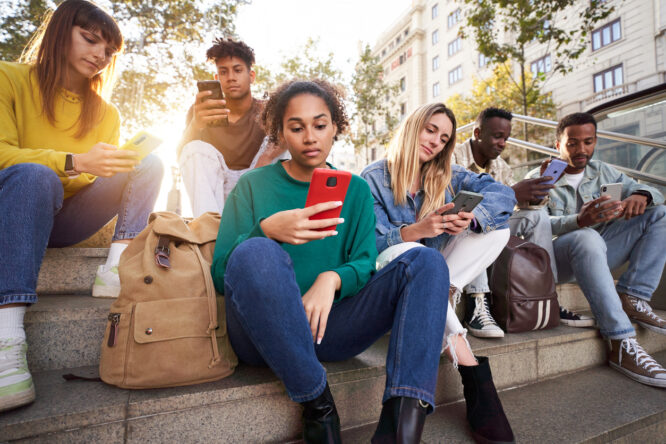It’s pretty wild that the generation with the most entertainment options in human history is also the most bored, but here we are.

Gen Z has literally millions of videos, games, songs, and shows at their fingertips, yet they’re constantly saying they’re bored out of their minds. It’s not that they’re ungrateful or lazy—there’s something genuinely weird going on with how their brains work compared to everyone else’s. The same technology that was supposed to cure boredom forever might actually be making it way worse. This isn’t about throwing shade at Gen Z; it’s about figuring out how the world changed so dramatically and what that means for all of us.
1. Their brains are basically addicted to constant stimulation.

Growing up with smartphones and TikTok has literally rewired Gen Z’s brains to expect something new every few seconds. They’ve never experienced true downtime because there’s always been another video to watch or notification to check. When that constant stream of new stuff suddenly stops, their brains basically panic and scream, “I’M BORED.”
Older generations learned to chill out during quiet moments because they had to—there wasn’t always something to do. Gen Z never developed that skill because why would they? There was always another meme to scroll through. Now, when they’re stuck without their phones, they feel genuinely uncomfortable in a way that probably seems dramatic to everyone else.
2. Too many choices are breaking their brains.

When Netflix has 15,000 titles and Spotify has 70 million songs, just picking something becomes exhausting. Your parents were happy watching whatever was on TV because they had like three channels. Gen Z has to choose from literally everything that’s ever been made, which is actually kind of overwhelming when you think about it.
They’ll spend 30 minutes scrolling through Netflix trying to find something to watch, then give up and say they’re bored. It’s not that nothing looks good—it’s that everything looks equally mediocre when you have infinite options. Sometimes having less choice actually makes you happier, but Gen Z will never know that feeling.
3. TikTok destroyed their attention spans.

Fifteen-second videos have trained Gen Z’s brains to expect entertainment in tiny, rapidly changing chunks. Watching a two-hour movie now feels like torture because their brains keep waiting for the scene to change every few seconds. It’s not that they can’t focus—they’ve just been programmed to expect constant novelty.
Even YouTube videos longer than five minutes feel like a commitment now. Their brains have been trained to process information like they’re speed-reading, so anything that moves at a normal human pace feels boring. A 90-minute movie might as well be watching paint dry when your brain expects the content to change every few seconds.
4. They never learned how to be alone with their thoughts.

Being bored used to lead to cool stuff—daydreaming, coming up with ideas, or just zoning out and letting your brain rest. Gen Z has never experienced real boredom because they’ve always had something to scroll through. They don’t know that boredom can actually be productive and necessary for your brain.
Now, when they’re forced to sit with their own thoughts for five minutes, it feels awful instead of peaceful. They’ve never exercised those mental muscles that help you be comfortable in your own head. The silence feels loud and uncomfortable because they’re not used to hearing their own thoughts without background noise.
5. They’ve seen everything before.

Gen Z has consumed more content in their short lives than previous generations saw in decades. Every movie plot, every meme format, every viral trend feels like something they’ve already seen a million times. What seems fresh and exciting to older people often feels recycled and boring to them because they’ve literally seen it all.
It’s actually kind of sad when you think about it—they’re experiencing content fatigue before they’re even 25. When you’ve seen every possible variation of every joke and story, it’s really hard for anything to surprise or delight you anymore. They’re jaded not because they’re cynical, but because they’ve genuinely experienced too much too fast.
6. Everything has to be instant, or they lose interest.

Same-day delivery, instant downloads, and immediate responses have made waiting for anything feel unbearable. Learning guitar takes months before it’s fun, reading a book requires patience, and developing any real skill means dealing with the boring beginner phase. Gen Z often quits before they get to the good part because the payoff isn’t immediate.
Previous generations understood that good stuff takes time, but Gen Z has been trained to expect instant gratification in literally everything. They’re missing out on tons of actually fulfilling activities because they can’t push through the initial sucky period that comes with learning anything worthwhile.
7. They mostly just consume instead of create.

Gen Z spends most of their time watching other people’s content instead of making their own fun. They watch streamers play games instead of playing themselves, watch cooking videos instead of experimenting in the kitchen, and scroll through art instead of trying to make some. Consuming is easier than creating, but it’s also way less satisfying.
Previous generations had to entertain themselves—they built forts, made up games, or learned instruments out of sheer boredom. Being forced to create your own entertainment is actually more engaging than having it spoon-fed to you, but Gen Z never had to develop those skills because there was always something ready-made to consume.
8. Their fun has to be Instagram-worthy.

For Gen Z, entertainment isn’t just about having a good time—it’s about getting content for their social media. If an experience doesn’t translate well to Instagram or TikTok, it feels less valuable, even if they personally enjoyed it. They’ve learned to measure fun by how many likes it gets, which is honestly exhausting.
This means they’re always performing their lives instead of just living them. Everything becomes potential content, which turns relaxation into work. It’s hard to be genuinely entertained when you’re constantly thinking about how to document and share the experience for maximum engagement.
9. They’re way more anxious than anyone wants to admit.

Gen Z is dealing with climate change anxiety, economic uncertainty, social media pressure, and knowing about every terrible thing happening everywhere all at once. When you’re constantly worried about the future, it’s pretty hard to enjoy a stupid Netflix show or get excited about hobbies.
What looks like boredom might actually be anxiety wearing a disguise. When their minds aren’t busy with distractions, all those scary thoughts come flooding back. They’ve learned to use constant entertainment as an anxiety management tool, but it backfires when nothing feels entertaining enough to quiet their worried brains.
10. Their friendships mostly happen through screens.

A lot of Gen Z friendships exist primarily through Discord, Snapchat, and gaming platforms rather than hanging out in person. Digital relationships can feel less real and satisfying than face-to-face connections, leaving them feeling socially empty even when they’re technically socializing all day long.
Online communication misses all the spontaneous, unplanned stuff that makes friendships exciting. When your social life is mostly texting and video calls, you don’t get those random adventures or deep conversations that happen when you’re just hanging out with nothing specific to do. Everything feels more scripted and predictable.
11. They’re overstimulated but completely unchallenged.

Gen Z gets tons of sensory input from their devices, but most of it doesn’t actually challenge their brains. Scrolling through feeds and watching short videos gives them stimulation without requiring any real mental effort. They’re consuming lots of content, but not really using their brains in meaningful ways.
It’s like eating candy floss all day—you’re technically consuming something, but you’re not actually getting any nutrition. Their brains are hungry for real challenges and creative problems to solve, but they keep feeding them digital junk food instead. No wonder they feel empty and bored despite being constantly entertained.
12. Nothing feels permanent anymore.

Gen Z lives in a world where trends change daily and nothing sticks around long enough to get attached to. The songs, memes, and shows they love today will be replaced by something completely different next week. It’s hard to get genuinely excited about anything when you know it’ll be forgotten in a month.
When everything feels disposable, nothing feels worth investing in emotionally. Why get really into a hobby when it’ll be out of style soon? Why binge a TV series when it might get cancelled randomly? This constant turnover makes everything feel shallow and temporary, which is pretty depressing when you think about it.
13. They’re burned out from too much screen time.

Gen Z spends more time staring at screens than any generation ever, but they don’t always realize when they’re fried from digital overload. Their brains need breaks from constant input, but they’ve never learned to recognize when they’re overstimulated. What feels like boredom might actually be their brain begging for a rest.
Instead of taking a break from technology when they feel blah, they usually look for more entertainment, which just makes the problem worse. They’re stuck in this weird cycle where they try to cure boredom with the same thing that’s causing it. Sometimes the solution to being bored is actually doing less, not more, but that’s a hard lesson to learn when you’ve never experienced true quiet.




